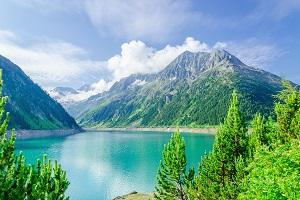
“There is a not a single major global challenge that does not involve water. This includes migration, conflict, disease, hunger, gender equity, population growth, urbanization, and climate change”. These were the words of UN-Water Chair, Mr. Gilbert Houngbo, as governments and key stakeholders from the Pan-European Region gathered in Geneva and online to review progress and showcase effective ways to implement the goals and objectives of the International Water Action Decade and water-related goals in the 2030 Agenda for Sustainable Development.
Organized by UNECE in cooperation with UN-Water and chaired by Ambassador Elisabeth Tichy-Fisslberger of Austria, the Pan-European Regional Preparatory Meeting on 12- 13 April provided a platform for a broad spectrum of participants to discuss the region's water priorities, successes, and challenges, with the intention of informing the agenda of the United Nations 2023 Water Conference (22-24 March 2023). The United Nations 2023 Water Conference, co-hosted by the Netherlands and Tajikistan, is the most important global water conference in nearly 50 years, after the United Nations Water Conference held in Mar del Plata, Argentina, in 1977.
Key issues tabled for discussion at the Pan-European Regional Preparatory Meeting were equitable access to water and sanitation, pollution prevention, ecosystem and biodiversity conservation, climate change management and resilience, water governance, management and protection of groundwater, and acceleration of progress through financing and innovation.
Executive Secretary of UNECE, Ms. Olga Algayerova, opened the meeting with a synopsis of the state of access to water and sanitation in the Pan-European Region, highlighting where and why this region still lags in achieving targets under SDG 6. She called on all states, organisations, and stakeholders for an urgent acceleration of efforts towards 2030 and emphasised the need for ongoing support for collaborative platforms and partnerships across the Pan-European region. In this regard, the Convention on the Protection and Use of Transboundary Watercourses and International Lakes (Water Convention) was highlighted by numerous participants as being a key catalyst for water cooperation, with many benefits for sustainable development, regional cooperation, and peace.
Participants repeatedly reaffirmed the need for accelerated progress toward the achievement of SDGs and the key role water can play in this respect. Participants emphasized that water should be the “deal-maker”, the leverage point for a green economy, climate resilience and a more sustainable and inclusive world. Inter-sectoral and inter-disciplinary approaches, such as the water-food-energy-ecosystem nexus, which seek to harness interconnectedness and interdependencies across sectors and reduce related barriers and trade-offs, were identified as underpinning acceleration for achievement of SDG 6 and all water-related SDGs. Integrated approaches to water and health, such as for COVID-19 recovery, will also be vital. The Protocol on Water and Health, jointly serviced by UNECE and the WHO Regional Office for Europe, provides practical tools for translating such approaches into action.
Participants discussed climate change as a sustained and growing challenge facing the region. Climate change already costs the Pan-European Region billions of dollars annually and threatens to increase if the status quo continues. There were repeated calls for inter-sectoral approaches and “de-siloing” sectors to harness collaboration and synergies on water to tackle the climate crisis. This will be integral in developing new, and strengthening existing, sustainable solutions, including climate-resilient infrastructure, wastewater treatment and re-use technologies, circular economy and nature-based approaches.
Increased cooperation, especially in transboundary contexts, is crucial to combat the effects of pollution that are a growing threat in the region and globally. For groundwater, “making the invisible visible” via data collection, monitoring and exchange of information is imperative to tackle data gaps and strengthen governance. Cooperative arrangements and strong legal and institutional frameworks will help to underpin effective and sustainable long-term water management.
Finally, many participants called for the appointment of a United Nations Special Envoy on Water as a way to increase the long-term visibility of water and appreciation of its growing criticality.
The Pan-European Regional Preparatory Meeting provided inputs on regional priorities, challenges and good practices that will feed into the UN Secretary-General report to be prepared in advance of the United Nations 2023 Water Conference and other preparatory activities to the Conference. A Chair’s Summary will be finalized in the coming weeks.

